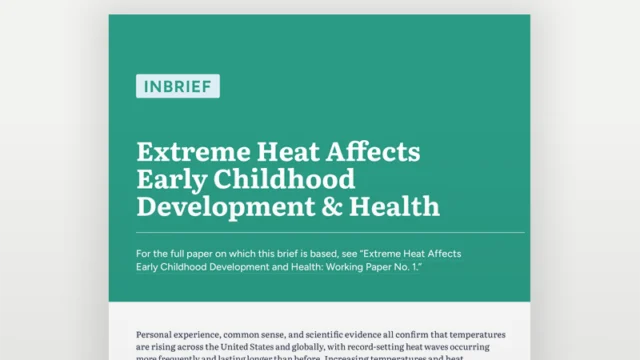InBrief | Extreme Heat Affects Early Childhood Development & Health

View full text of the graphic
InBrief: Extreme Heat Affects Early Childhood Development & Health
For the full paper on which this brief is based, see “Extreme Heat Affects Early Childhood Development and Health: Working Paper No. 1.”
Personal experience, common sense, and scientific evidence all confirm that temperatures are rising across the United States and globally, with record-setting heat waves occurring more frequently and lasting longer than before. Increasing temperatures and heat waves impact every cell and organ system in the human body. And, while the dangers of excessive heat on populations like older people are well recognized, its impacts on pregnancy, infancy, and childhood often get less attention. However, the consequences, including low birth weight, learning loss, and heat-related illnesses, are significant.
Extreme heat affects infants and young children more than most adults because their smaller bodies heat up more quickly, and they have less capacity to release heat via sweating. The biological systems that regulate body temperature in infants and young children are less developed and, therefore, less efficient. Infants and young children also can’t seek out cooler environments or get water to drink without relying on adults. Children and adolescents with chronic health conditions, such as asthma, obesity, or diabetes, are even more susceptible to heat-related illnesses. The effects of heat on infants and young children are influenced by a range of factors that, when combined, influence how they are affected. Chief among these factors is socioeconomic inequalities, which disproportionately impact marginalized racial and ethnic groups. Read more about structural disadvantage and other factors that shape the impact that excessive heat has on a child’s health and development in the full Working Paper.
Practical, actionable solutions exist to prevent or minimize these impacts, and many communities, organizations, and nations have already begun implementing them to good effect. More information about existing strategies and solutions can be found below and in our Heat Solutions Spotlight.
Heat Has Especially Powerful Effects on Babies and Young Children
During periods of extreme heat, the physiological changes in pregnancy pose additional risks, as heightened metabolism and increased body mass already generate more heat, potentially leading to preterm birth. Elevated temperatures also correlate with increased rates of stillbirth and low birth weight infants, which are linked to long-term health complications. In young children, their reduced capacity to sweat and dissipate excess heat can result in severe consequences, including muscle breakdown, kidney failure, seizures, and even death. In addition to these immediate effects, heat can disrupt development through three distinct pathways:
Effective Strategies Can Create a Multiplier Effect
Strategies that address high temperatures and other aspects of climate change are also strategies that promote the healthy development of children. The harmful effects of excessive heat must be addressed through strategies directed at three levels:
- Immediate actions to reduce harm from extreme heat events;
- Adapting our services, systems, and infrastructure to be better positioned to withstand increased heat; and
- Addressing the root causes behind our rapidly heating planet.
Solutions at each level can be implemented through local, county, state, and federal policy, as well as social services, education, and health care. This must be done in consultation with local communities and leaders to address local needs effectively. To address the effects of excessive heat on children, policymakers and community leaders can learn from a range of practical strategies and approaches already demonstrating positive impact in communities throughout the country and the world:
-
- Consider where people spend time during pregnancy and childhood. Childcare programs, K-12 schools, summer programs, homes with young children, and more, should be evaluated for their ability to protect people during pregnancy and childhood from exposure to excessive heat and provide what they need to withstand it. Ensuring cooling options are available during pregnancy should be considered integral to prenatal care.
- Improve structural cooling options. New building architecture, retrofitting of older buildings, and urban planning can reduce heat and efficiently use energy. As one example, urban greening campaigns that increase tree canopies and surfaces covered with vegetation can decrease air temperatures and provide shade.
- Install air conditioning and other cooling mechanisms. More than $13 billion is lost per year in lower future earnings due to learning losses from school days that are just 7°F higher than current averages. Yet, the annualized cost of installing and maintaining HVAC systems in all U.S. public schools would be less than one-third of that amount. A range of less power-demanding solutions also exist, from heat sinks to “swamp coolers.”
- Provide support for affordable, reliable access to the power grid, with particular emphasis on power from sustainable sources. Getting an air conditioner is no help if it can’t be powered or if power is unaffordable. In some areas, pediatricians are helping families document the medical necessity of maintaining access to utilities; health insurance may even pay for utility bills in some states.
- Develop heat action plans. Communities and healthcare systems can come together to build community resilience. Heat action plans coordinate local government response with other agencies, healthcare facilities, and community organizations. To read more about these solutions, see the full paper, “Extreme Heat Affects Early Childhood Development and Health: Working Paper No. 1” and related Action Guide for Policy.
To read more about these solutions, see the full paper, “Extreme Heat Affects Early Childhood Development and Health: Working Paper No. 1” and related Heat Solutions Spotlight.